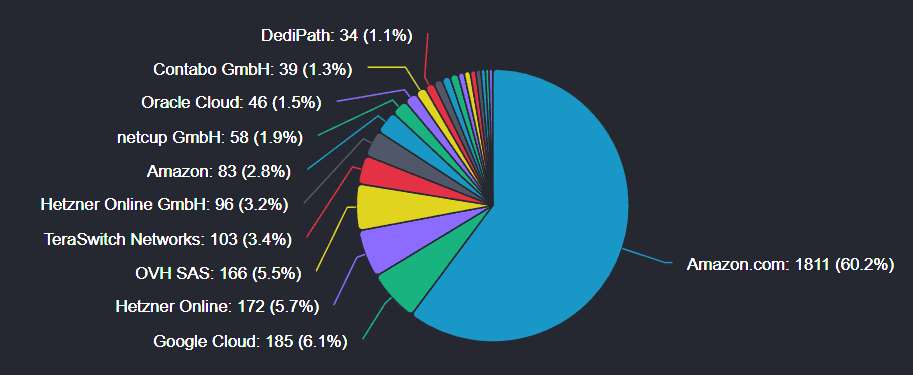News - How decentralized is Ethereum?
Decentralization is part of the DNA of Ethereum - that's the theory. In reality, the nodes depend on cloud service providers such as Amazon. Playing with fire?
Amazon is secretly expanding its influence in the crypto sector. Not even actively: the blockchains are coming naturally. Most of the Ethereum nodes now run through Amazon Web Service, the Internet giant's cloud computing platform. So decentralization seems to be becoming more and more of a hollow ter. The Solana community can tell you a thing or two about how problematic such a dependency can be. Ethereum founder Vitalik Buterin, however, thinks it will take a few more years to correct this imbalance. To what risk does Ethereum expose itself?
Sixty percent of all Ethereum nodes currently run through Amazon Web Service. Only six percent use the Google Cloud. No other provider is as dependent on the network as Amazon - a thread that can sometimes snap.
Source: Ethernodes
It is somewhat ironic that the operation of nodes seems to focus on Amazon precisely because of its decentralized nature, as Parithosh Jayanthi, developer at the Ethereum Foundation, explained to Germany's BTC-ECHO: "As a decentralized network, there is no way in the protocol for us to prevent people from running all their nodes through one central Web provider." Why so many choose Amazon: "easy scalability and high uptime."
Solana gets off to a good start
This development is not without its critics. Both for idealistic and practical reasons, as the network failure of Ethereum competitor Solana has already shown. Last November, German Web service provider Hetzner shut down the flow to Solana, taking more than 1,000 validators offline without fail. Hetzner cited prevailing terms and conditions, which were apparently ignored in the Solana community.
According to Parithosh, there is a similar risk with Ethereum: "If the web provider in question blocks all users of a particular class, it would cause all these nodes to go offline." However, the worst-case scenario, a total outage of Ethereum, can be ruled out. "Ethereum nodes do not all have to be validators, the uptime of the validators is what ensures the continuous block production of the chain."
Thus, a failure of many nodes "need not mean that Ethereum as blockchain goes offline," "only the business use case would suffer." According to the developer, it is therefore "extremely important that Ethereum nodes are hosted in different regions and services to avoid a single point of failure." This makes for "a very resilient blockchain." It also protects the network from regulatory intervention.
"Stateless" Ethereum nodes
Ethereum creator Vitalik Buterin identifies the centralization of nodes as one of the network's biggest weaknesses. At this year's Korea Blockchain Week, the genius programmer estimated that it could take 10, maybe even 20 years for Ethereum to free itself from the clutches of Amazon and the like.
One solution being discussed and developed under "statelessness" is reducing the amount of data. "Today, you need hundreds of gigabytes of data to run a node," Buterin said. "With stateless clients, you can run a node with practically zero data."
This approach, Parithosh explains, would allow "trivial verification of the blockchain." This would allow "a much larger number of nodes to follow the blockchain," which in turn could use the network "at extremely low cost." A win-win, in other words. It would also "significantly lower the barrier to entry."
Node operation would eventually become cheaper, consume fewer resources and thus be manageable from a smartphone in the future. "In the longer term, there is a plan to maintain fully authenticated Ethereum nodes that you can literally use on your phone," Buterin promises.
Parithosh expects the research work to take a few years. Until then, Amazon's shadow will likely linger over Ethereum.







